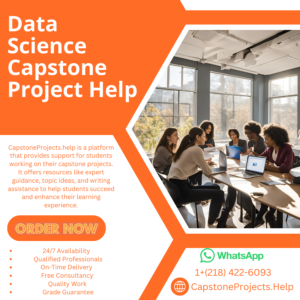Data Science Capstone Project Help
A capstone project is a culminating task designed to allow students to demonstrate their knowledge and apply it to Real-World issues. Through this experience, essential teamwork, communication and problem-solving skills can be developed.
MSDS students can participate in challenging projects offered by sponsoring organizations and guided by domain mentors.
Choosing a topic
Finding an appropriate capstone project topic is a vital element of data science education. Not only will you demonstrate your skills and knowledge, but also create something useful as part of a career portfolio. When selecting your capstone topic, keep your personal interests and career aspirations in mind as well as consulting your professors, advisors and mentors for valuable insight and advice that may lead to refining ideas or linking you up with resources or contacts.
Sponsoring organizations work directly with students to address real business problems or questions, in projects that use knowledge from multiple disciplines to solve complex problems. Often the solutions produced are far-reaching for both their sponsor organization and industry – for instance dashboard development, data pipeline construction and machine learning models may all have significant impacts.
Identifying a problem
Identification is a vital step in creating a capstone project. This involves recognizing an issue that needs solving and using data to Develop Solutions – whether from business or social science research.
Capstone projects entail in-depth analyses of quantitative data. This process, known as “data analysis,” serves to glean insights and create relationships from this information, as well as answer questions and draw conclusions based on research results.

What We Do
Students enrolled in the Master of Applied Data Science program must participate in real-world projects sponsored by companies and organizations, with completion taking two semesters. Sponsors select projects aligning with their industry, ranking their preferred projects before assigning students with faculty mentors for guidance.
Developing a hypothesis
Hypothesis development for your capstone project is an integral component of research. A good hypothesis will help clarify your goals and objectives while providing direction for future studies. A testable and measurable hypothesis should also be relevant to your field and address real world issues.
To create a hypothesis, it’s necessary to identify all of the variables that could potentially alter the outcomes of your research. For example, when Studying Different Big Mart coffee brands’ performance you must be able to identify factors like price and sales as factors in developing an hypothesis.
Explaining why you chose specific research methods is also essential in helping readers comprehend your results and identify areas for future study. Finally, provide recommendations based on your findings.
Creating a plan
Capstone projects are an integral component of data science education for students. They allow them to apply the skills learned during their studies directly to real-world problems while helping to retain all of the knowledge gleaned over their academic career and prepare them for employment in real world settings.
Students work together in teams to conduct research tailored to the needs of their sponsoring organization, then present their results at a capstone event at the end of their program. Their grades will depend on both these components as well as submitting a final report directly to their research supervisor.
Sponsoring organizations gain access to a team of MSDS Students who can offer advice to address strategic or operational challenges. These students offer fresh perspectives when reviewing your data and can create innovative solutions.
Developing a solution
Working on a capstone project helps students acquire the necessary professional skills for life after school. Working on real-world problems and demonstrating understanding of data science tools and concepts provides them with invaluable experience, while network opportunities present themselves at this time.
An MS in Applied Data Science team created an app to measure the speed of a pitched baseball using image recognition technology. They employed their skills in data cleaning, feature engineering and machine learning to develop this solution that has practical uses for sports fans worldwide.
Sponsors gain from this hands-on opportunity to learn and practice cutting-edge data science techniques and methodologies, as well as accessing a powerful pool of world-class students, instructors, and cited researchers.
